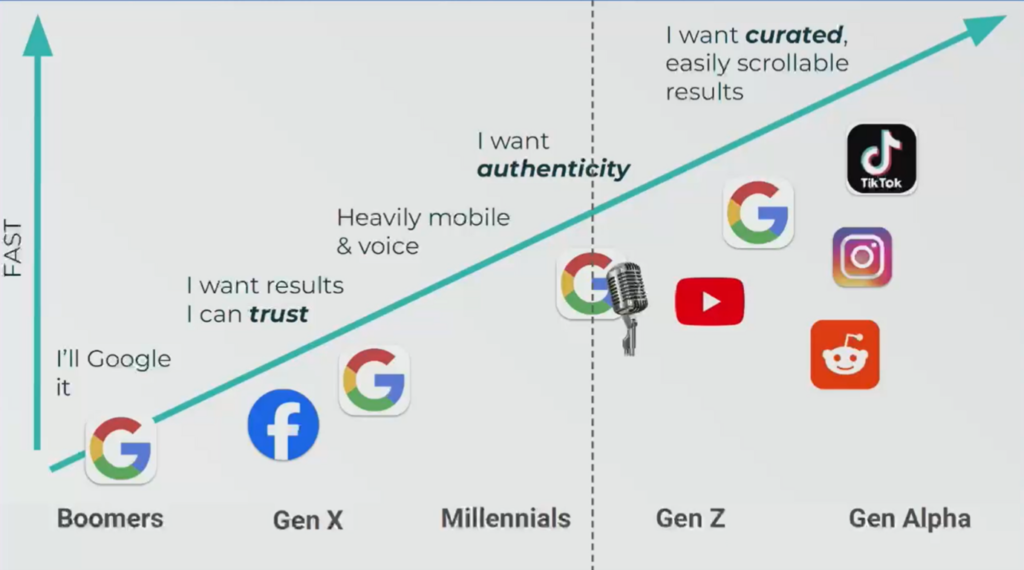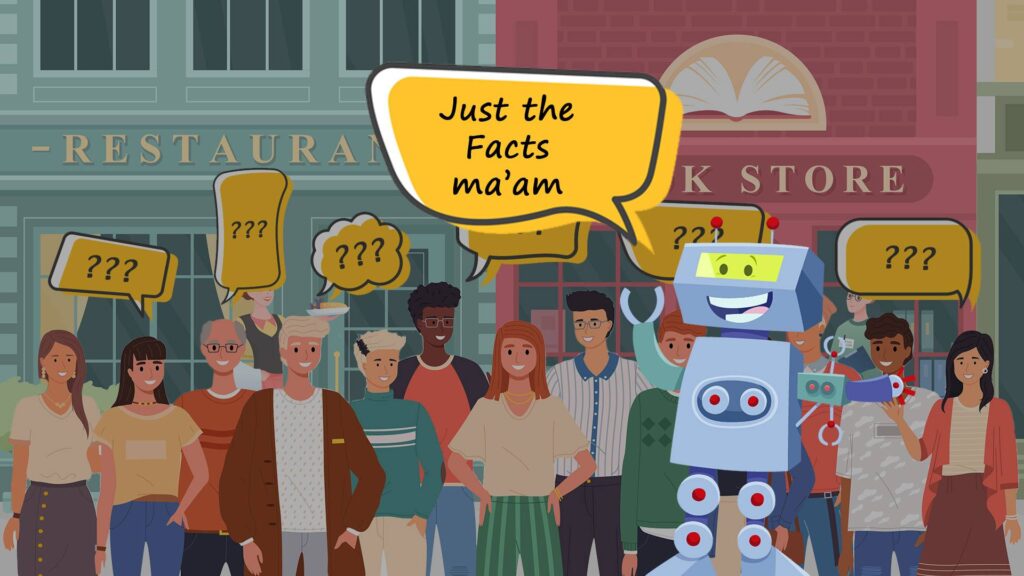Have you ever stopped and wondered what a prompt is? Or perhaps a token, or context? And let’s not forget hallucinations.
It’s incredible how technology subtly but profoundly influences our use of words and the way we speak.
Or when the word Google became a verb, meaning to search. It’s embedded within our language, and its presence is taken for granted. When did it become normal that Google was synonymous with searching the internet? I checked; the internet reports that 2006 was the turning point.
Now, however, the verb of Google dates a person. Research shows that it is primarily Gen-X and Baby Boomers who use Google.
The other generations have or are in the process of switching to alternatives like Tiktok, Youtube, Instagram, and, more recently, Generative AI like ChatGPT as the internet search tool of choice (as identified by research published by PI Datametrics—graph below).

It’s not that Google is going away. They command over 90% of the search engine market, however, even they are adapting. Go back 12 – 24 months from 2025, and a typical search result page on Google would look something like;

Now it looks like this;

We have AI Overview, creator content, shopping, and far more social content, which for many years was shunned by the search engine index but now dominates the SERPS. Those once valuable high-ranking mentions that SEO practitioners fought for have been relegated to below the fold.
It’s an interesting introduction, you might think, but what does this have to do with the title “Consumers do not know they’re prompting”?
There’s an SEO tool online called Keyword Tool (https://keywordtool.io). There, you can use any intent keyword across all major internet platforms, from Google, Youtube, Amazon, and Tiktok, to see what consumers are searching for on each one.
For the sake of comparison, let’s say you want to buy a pair of running shoes. How might you search for these? Personally, I would write a search query like “best men’s road running shoes for a beginner.” I would use this across all online tools. I wouldn’t try to get creative and change the query just because I am using Amazon instead of Google. It would be the same one everywhere.
Using Keyword Tool, using this query, here are the alternatives that it suggested: (Incidentally, I set the location to the UK and spoken language to English). Each suggestion reflects how consumers are asking similar questions on each platform. The related keywords reflect what consumers are asked rather than the output from an AI.
| Search Engine / Social Platform | Example Consumer Search Keywords/Hashtags |
|---|---|
| best men’s road running shoes uk best men’s running shoes for beginners uk best men’s road running shoes 2022 best men’s road running trainers best men’s running trainers for beginners uk | |
| YouTube | best men’s road running shoes best road running shoes for beginners men’s road running shoes budget road running shoes road running shoes review |
| #bestrunningshoe #bestrunningshoes #bestrunningshoesever #bestrunningshoeever #bestrunningshoesformen | |
| Tiktok | best running shoe best running shoes men best running shoes for women best running shoes men 2025 best running shoes for track |
While there are semantic differences between how consumers ask questions, my original query wouldn’t have worked across Instagram and Tiktok, leaving consumers to leverage a similar, albeit alternative approach.
So, what does this mean for AI Answer Engines and how consumers search for information?
I’ll start this one with a question: why would a consumer search differently on Chatgpt than they would for the likes of Google, TikTok, and Instagram?
I do not believe that they would.
If you delve into Generative-AI, the word prompt quickly crops up.
Any internet search for prompt quickly returns what feels like a million and one pieces of advice on how to prompt. I asked Google this very question, and it identified 844,000,000 results.
With Google’s search engine dominance, it feels safe to say that their AI Overviews will dominate in the AI Answer Engine arena.
And with much of the world trained on asking questions in a specific, very non-prompt way, why would consumers change their behaviour to support a new platform?
Surely, each AI answer engine platform, like ChatGPT and Perplexity, would be better placed to align with how the consumer thinks and works, eliminating unnecessary friction when using their respective tools.
I know that prompt strategies like zero-shot, few-shot, and in-context learning can produce very positive results. However, is it reasonable to expect consumers to learn these skills?
As content creators, shouldn’t we assume that consumer behaviour will remain constant and that search methods will remain consistent with what we see across each social platform?







